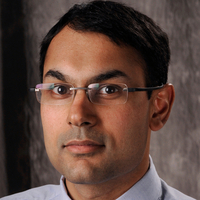Menu
- Undergraduate
- Graduate
- Research
- News & Events
- People
- Inclusivity
- Jobs
Back to Top Nav
Back to Top Nav
Back to Top Nav
As high-fidelity sensors such as always-on cameras and microphones become more common place, we will need to reconsider our notions of privacy. Apu Kapadia, Indiana U.

Abstract: As high-fidelity sensors such as always-on cameras and microphones become more common place, we will need to reconsider our notions of privacy. How will people react to constant surveillance by their peers ("sousveillance") and what technical solutions can enhance privacy in this new age? I will highlight some of our interdisciplinary research on answering and addressing these questions in the context of wearable cameras. I will also talk about how cameras can enhance privacy, e.g., by aiding populations with visual impairments with a visual assessment of their surroundings.
Bio: Apu Kapadia is an Associate Professor at Indiana University Bloomington. Before joining Indiana University, he received his Ph.D. in Computer Science from the University of Illinois at Urbana-Champaign (UIUC), was later a Post-Doctoral Research Fellow here at ISTS for three years working with Sean Smith and David Kotz, and then a Member of Technical Staff at MIT Lincoln Laboratory.
Apu Kapadia is interested in topics related to computer security and privacy. He is particularly interested in accountable anonymity; pervasive, mobile, and wearable computing; human factors; crowdsourcing; and peer-to-peer networks. For his work on accountable anonymity, two of his papers were named as 'Runners-up for PET Award 2009: Outstanding Research in Privacy Enhancing Technologies'. His work on privacy in the context of wearable cameras received an Honorable Mention Award at ACM CHI 2016. His work on usable privacy controls was given the 'Honorable Mention Award (Runner-up for Best Paper)' at the Conference on Pervasive Computing, 2007.
Apu Kapadia has received five NSF grants, including an NSF CAREER award in 2013, and a Google Research Award in 2014. He was also a recipient of the Indiana University Trustees Teaching Award in 2013 and a Distinguished Alumni Educator Award from the Department of Computer Science at the University of Illinois at Urbana-Champaign in 2015. For the years 2015 and 2016, he was Program Co-Chair of the Privacy Enhancing Technologies Symposium (PETS) and Co-Editor-in-Chief of the associated journal Proceedings on Privacy Enhancing Technologies (PoPETs).
Events are free and open to the public unless otherwise noted.